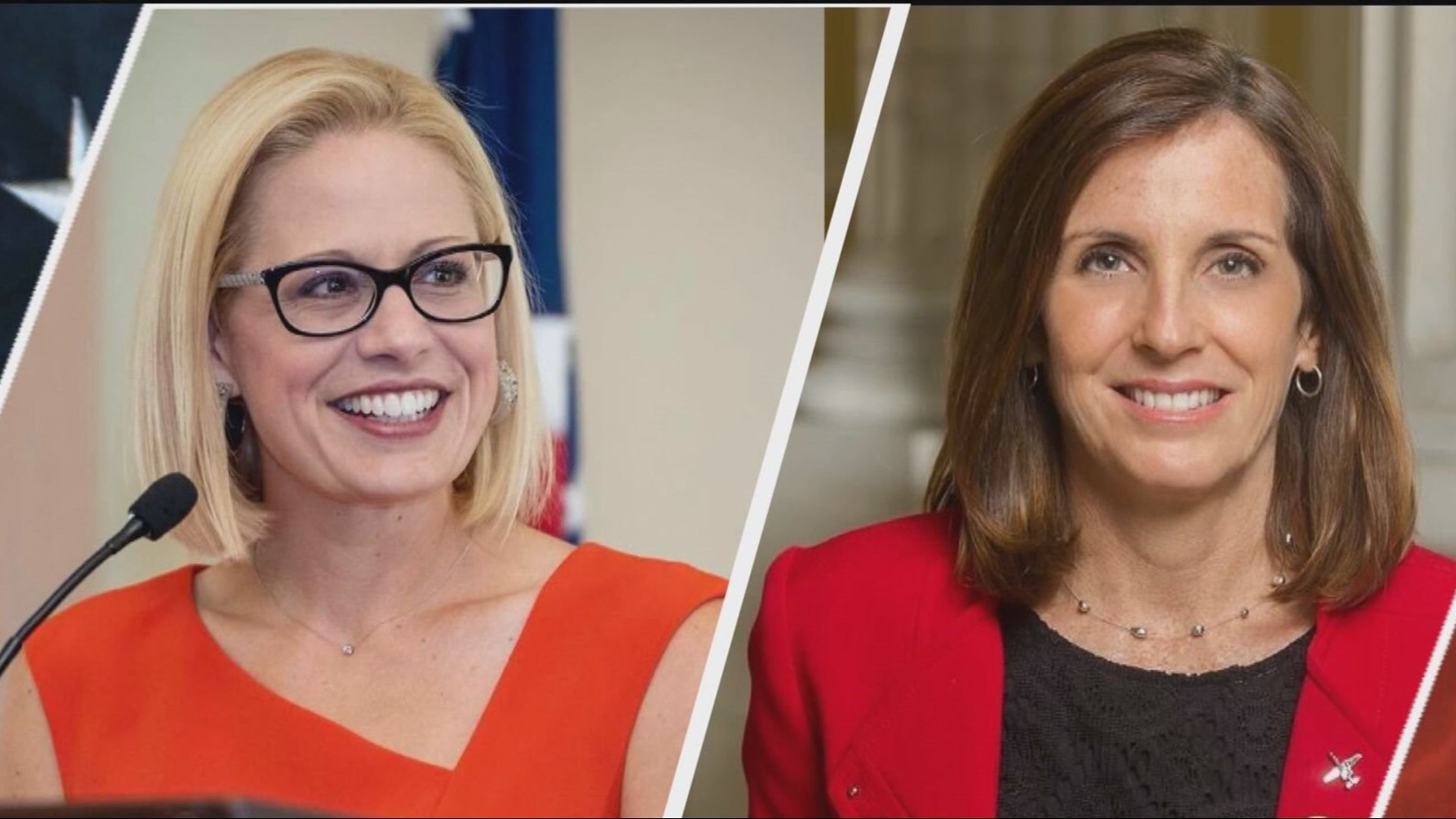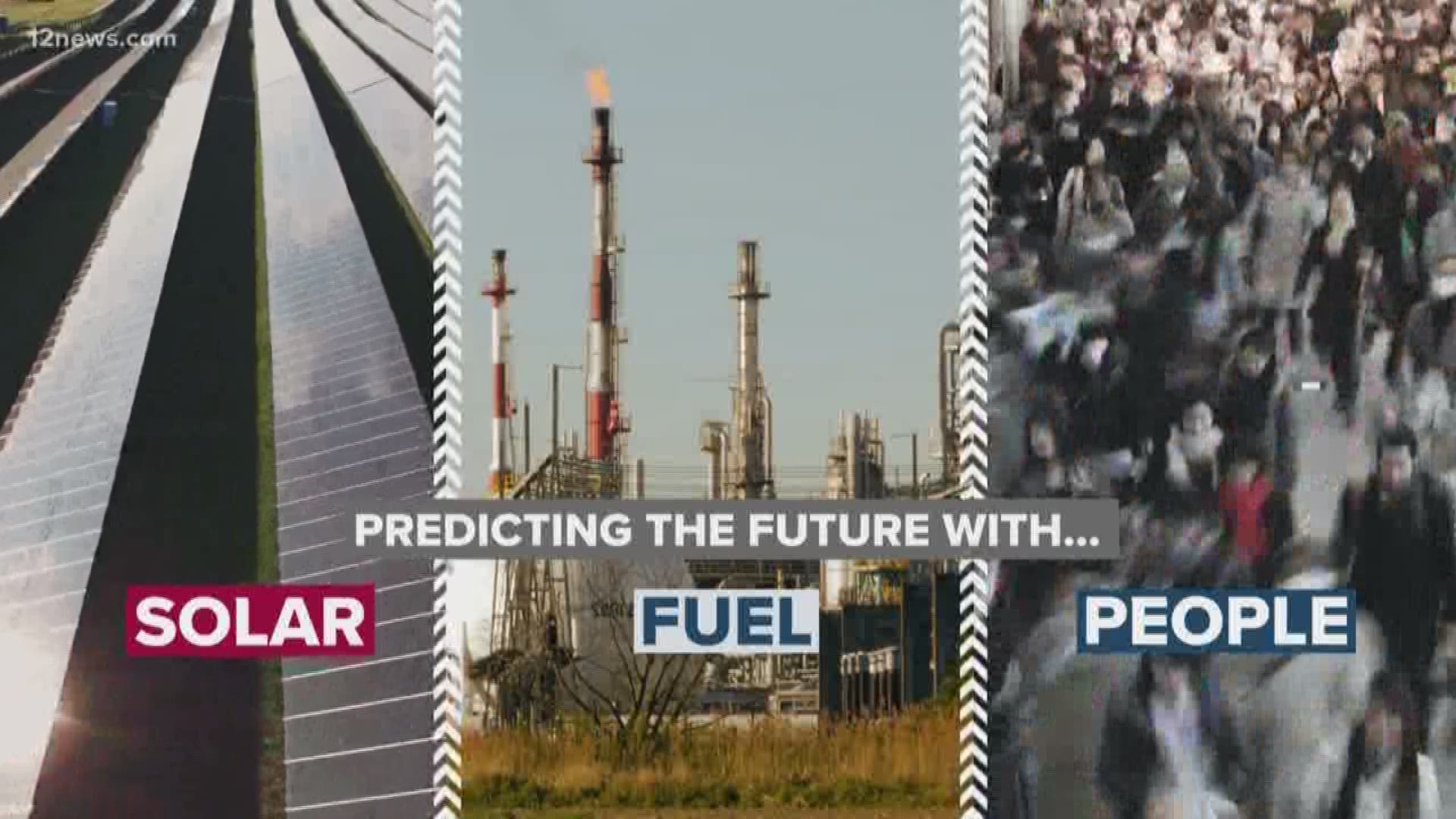With everything being thrown in your face during election season, voting can be a daunting task.
Political ad after political ad, debate after debate, all of the different offices, so many propositions. Who do I vote for? Why should I care? Wait...did someone commit treason? What the heck is Prop 127?
Voting can be exhausting, but it's extremely important. It gives you a voice in what goes on in Arizona, and according to Meet the Press host Chuck Todd, Arizona could become the next major battleground state.
Come November 6, Arizona voters will be voting on a new U.S. Senator to fill Jeff Flake's seat, governor and several different propositions — all of which could have a vital impact on Arizona's future.
So get out and VOTE.
Here's what you need to know before you head to the polls in November:
In Maricopa County, we're all too familiar with voting issues. Early voting let's you skip those lines and get your right to vote done, well, early.
You actually don't have to wait until November 6 to cast your vote. Voters can still request a mail-in ballot until 5 p.m. on Oct. 26. The FINAL day to mail back the mail-in ballots is October 31.
Click here to request a Maricopa County mail-in ballot.
And if you're voting in Maricopa County, Maricopa County Elections offices will be open from now through Nov. 2 during normal operation hours.
The 15th floor of Phoenix City Hall will also be available for early voters.
Click here to find out where the closest early voting center is to you or where to vote on Election Day.
One of the biggest races of this midterm across the country.
The seat could pretty much guarantee Republicans maintain control of their majority in the Senate, or potentially set up a change in power to the Democrats.
Martha McSally, a two-term Republican congresswoman from Tucson and retired combat pilot, and Kyrsten Sinema, a three-term Democratic congresswoman from Phoenix, are facing off for the Senate seat.
It’s the most expensive election in Arizona history—on track for $50 million in spending on TV ads—and polling shows Sinema and McSally are locked in a dead heat.
The winner will be the first woman to serve as U.S. senator for Arizona in the state’s 106-year history.
Speaking of races that could shape Arizona immediate future, there's an Arizona gubernatorial showdown on the ballot.
The Republican incumbent Doug Ducey is up against Democratic challenger David Garcia.
Garcia is an education professor at Arizona State University who ran unsuccessfully for state school superintendent four years ago. Ducey was elected as Arizona's governor in 2014, following a stint as state treasurer.
The two have heavily clashed over the state of education in Arizona and border security.
Sinema and McSally's Senate run opened up two districts for new representatives. One of which is District No. 9 where Phoenix Mayor Greg Stanton is hoping to take his political aspirations to Washington.
A familiar face in the Arizona political world, Ann Kirkpatrick, is running in McSally's old District No. 2.
Several Arizona Republicans are hoping to keep their seats, including Debbie Lesko who won District No. 8 over Democrat Hiral Tipirneni in a special election back in April. She is running again against Tipirneni.
READ MORE: Arizona Congressional District 4: Gosar vs. Brill
To read all about the candidates running in your district visit the Arizona Secretary of State website.
The bigger races might be governor and that heated Senate race, but other important offices are up for grabs this election.
Arizona voters will decide who will serve as the state's secretary of state, superintendent of public instruction, state treasurer and attorney general.
They also get to elect the state's mine inspector who keeps track of all of the mines in the state, including the more than 100,000 abandoned one.
It's an important role, considering Arizona's mining history.
There are also Arizona state senators on the ballot. You can find information for all of the candidates on the Secretary of State's website under "Legislative."
There are five seats up for election in Maricopa County for the Central Arizona Water Conservation District Board of Directors. Fourteen people are running.
The board makes decisions about the Central Arizona Project, the 336-mile canal that delivers Colorado River water from Lake Havasu to Phoenix and Tucson, including setting certain property taxes to finance the project and setting wholesale water rates.
With water levels at Lake Mead declining, whoever is elected to a six-year term on the board will face several challenges.
Arizonans will have the chance to decide which state judges stay on the bench and which ones leave it.
It's something called the Judicial Performance Review.
Judges are chosen through a merit selection, a system that finds the most qualified people, and then appointed by the governor in Arizona's three biggest counties.
But Arizona voters decide whether these judges keep their job in a judicial retention election. This vote differs from a regular vote in that judges are not on the ballot against an opponent.
A judge is retained if enough ballots are cast in favor of them staying.
A special election is being held to fill the vacancy left by Greg Stanton. There are four candidates on the ballot: Kate Gallego, Moses Sanchez, Nicolas Sarwark and Daniel Valenzuela.
A runoff is slated for March of next year if necessary.
Proposition 125 would change the state constitution to allow the Arizona State Legislature to adjust pension plans for corrections officers and elected officials.
The legislature had passed two bills to adjust the two pension funds on a cost-of-living basis rather than permanent benefit increases.
Proponents of the measure say Prop 125 could save taxpayers money and shore up Arizona's underfunded Elected Officials' Retirement Plan and Corrections Officer Retirement.
Opponents of Prop 125 say changing the pensions to a cost-of-living basis from a permanent benefit increase would discourage people from becoming corrections officers.
Arizona Proposition 126 aims to outlaw any new or increased tax on services that did not exist at the end of 2017.
Those who support Prop 126, also known as the Protect Arizona Taxpayers Act, argue that sales taxes disproportionately hurt low- and middle-class families, and the government imposing such taxes could also hurt small businesses.
Opponents of the measure argue that government needs funding to operate, and cutting off the possibility of sales taxes decreases the number of options for receiving that money.
Both Republican Gov. Doug Ducey and his Democratic opponent David Garcia oppose the proposition. The majority of funding in support of the proposition comes from realtors.
Prop 127 would require utility companies, like APS, to get 50 percent of their energy from renewable energy sources, such a solar, by 2030, regardless of the cost to consumers.
The Arizona Corporation Commission currently requires at least 8 percent to come from renewable energy sources, which was slated to increase to 15 percent in 2025.
Prop 127 would push that requirement to 12 percent by 2020 and 50 by 2030.
Utility companies would also be required to provide a detailed "compliance and implementation" plan to the Arizona Corporation Commission.
Opponents, like APS, argue it would drive up the cost for consumers while supporters of the prop say it will save Arizona money and reduce pollution.
This proposition is a little different, so make sure you read this one close.
Proposition 305 is a veto referendum, challenging Senate Bill 1431, meaning the people who got it on the ballot want a "no" vote on it. Save Our Schools Arizona collected enough signatures to add Prop 305 as a ballot measure, giving voters the option to vote "no" on it before SB 1431 would go into effect.
SB 1431 enacts an expansion of the state’s Empowerment Scholarship Accounts (ESAs) program to make all public school students eligible to apply for money that could be spent on private education, homeschooling, or other non-public education. That money could be used for tuition, books or other education-related costs. A "yes" on Prop 305 means, "Yes, I want SB 1431 to become a law."
Supporters of passing 305 say it helps parents make the best educational choices for their children, by providing an option to opt of public school. Those against it say it defunds public schools and uses public dollars for tuition at religious schools.
Proposition 306 is on the ballot in Arizona as a legislatively referred state statute dealing with clean elections.
If it passes, it will prohibit candidates from using their public financing accounts to give funds to political parties or tax-exempt 501(a) organizations that influence elections.
A "no" vote will continue to allow the Citizens Clean Elections Commission to determine whether candidates can transfer their public dollars to political parties or other groups.
A "yes" vote on Prop 306 would make the CCEC get approval from an outside council, the Governor’s Regulatory Review Council, before making its rules. That council is made up of members appointed by the governor.


